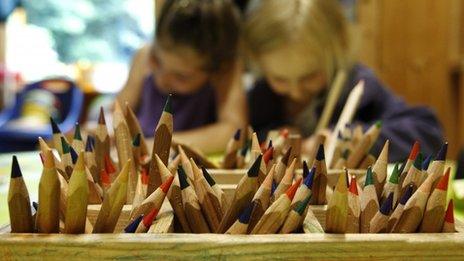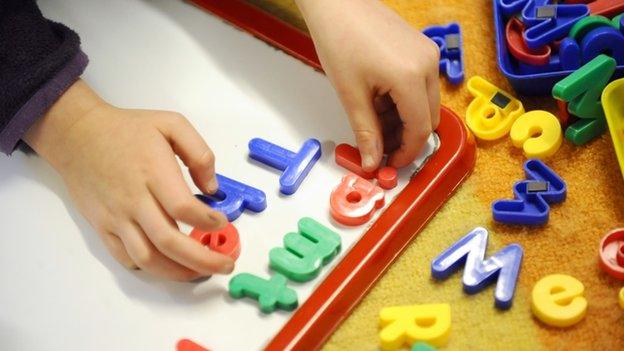Tests for four-year-olds 'unreliable and disruptive'
- Published
- comments

Four and five-year-old children vary greatly in levels of development
Official assessments of four-year-olds in England are unreliable and disrupt the early days of school when children should be settling in, a report says.
Teachers told researchers the tests, which were brought into some schools in September, distracted them from getting to know their pupils.
Many said the tests themselves were unreliable, duplicated work and did not marry with existing assessment systems.
Ministers say a fair baseline is needed to ensure pupils reach their potential.
The tests, which are being brought in to all schools from this September, measure basic reading ability, numeracy and writing, as well as children's social and emotional development.
This is done in one-to-one assessments with teachers, who use checklists that include a series of questions such as whether a pupil can maintain concentration when listening to others or can subtract using single-digit numbers.
The baseline assessment will be used to assess each child's level of development at the beginning of school, so the progress they make by the time they leave can be measured.
Analysis
By Hannah Richardson

It must have all seemed so simple to Department for Education officials.
Measure how far schools have brought their pupils by recording what they can do when they start primary and what they can do when they leave.
Surely this was a chance for those schools in disadvantaged areas, who might perhaps have large numbers of children with poor language skills, to show off their hard work?
It was a positive move, minister said, away from simply focusing on attainment, and would provide a very real context for later test results.
But, as ever, education works in a more nuanced way.
Many teachers say assessing children in their first days of school in this way, can disrupt the delicate process of forming relationships with these four-year-olds.
Many will be leaving parents for a whole day for the first time, and will take a while to warm to strangers.
They simply may not feel confident enough to reveal which letters or numbers they can recognise.
And nearly all schools will already have systems of assessing pupils, embedded within increasingly technical pupil progress-tracking IT packages.
So assessing a child on 47 different competencies is hardly going to be an appealing task for a hard-pressed teacher, especially when the tests themselves are claimed to have quite a margin of error.

Researchers from the University of London, commissioned by the National Union of Teachers and the Association of Teachers and Lecturers, carried out in-depth interviews with staff in five primary schools piloting the assessments, and quizzed 1,131 NUT and ATL members in a snapshot survey.
In some schools, extra teachers had to be employed to teach while the class teachers carried out the one-to-one assessments on each pupil, researchers said.
One teacher said: "If you have got 60 young people coming in... and you have to tick 47 boxes about all of them, of course your mind is going to be on that rather than talking to them about their nice shiny shoes and about their pet rabbit at home."
Of those surveyed, 59% said the assessment had disrupted the start of school for Reception pupils.
Another teacher said: "Baseline assessment is the biggest farce I have undertaken during my entire teaching career. The potential for children to guess at answers or to misinterpret things is too vast to give a clear representation of where children are at."
'Children are not robots'
Just under a third of those surveyed (31.5%), said the assessments were an accurate reflection of children's attainment at this stage.
The report concludes: "For many teachers, Baseline Assessment has had a negative impact on their working lives without benefiting the children they teach.
"It goes against the principles of good teaching in early years, and at the same time does not assess accurately enough to form the basis of a school performance measure."
ATL general secretary Mary Bousted said: "It is questionable how far any form of assessment can accurately show the knowledge and skills of a four-year-old.
"Children are not robots and do not develop at a regular rate, so we have grave concerns about the reliability of measuring their progress from age four to 11."
NUT general secretary Christine Blower said teachers had no faith in the baseline tests, adding: "It's unfair, it's not accurate, it's completely fallible. This set of results is a house built on sand, and the government really should reconsider."
A Department for Education spokesperson said: "As part of our mission to deliver educational excellence everywhere, we want to see all children pushed to reach their potential.
"In order to do that, and to recognise the achievements of schools in the most challenging areas, we want to measure the progress that all pupils make as well as their overall attainment. That means ensuring we have a robust and fair baseline from which to measure that progress."
- Published19 March 2015

- Published4 April 2015
